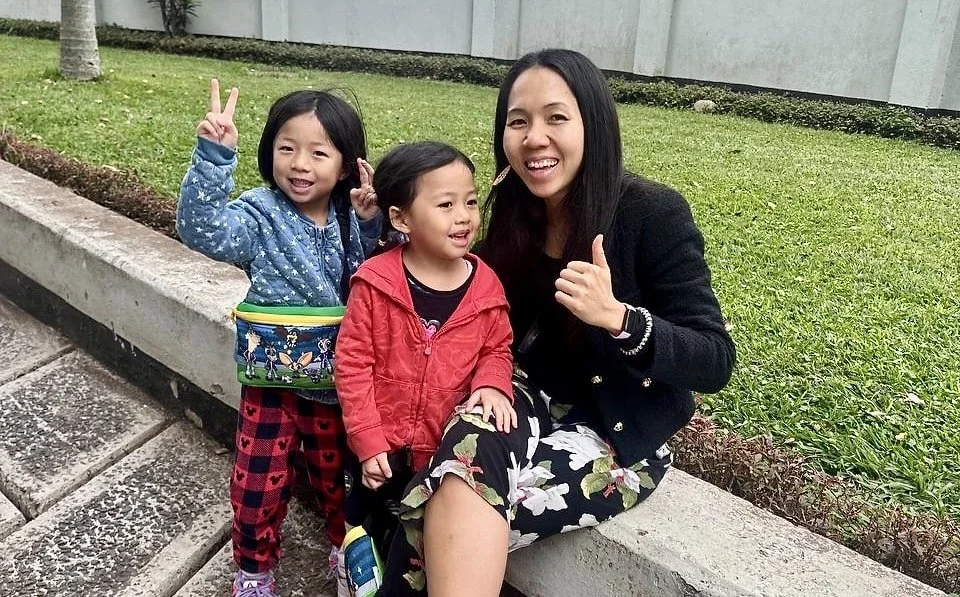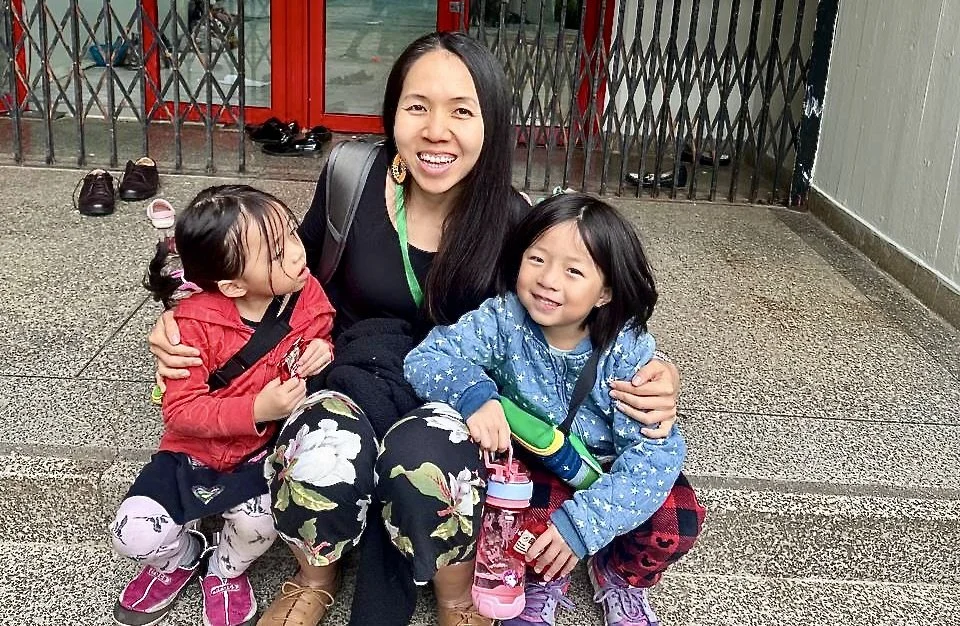“Will you just sit with me?”: A mother learns the ministry of presence
“Mama.”
“Yes sweetheart?”
I saw her lips quiver, eyes glazing over as she watched the hustle and bustle erupt around her. It was as if time stood still for her as the rest of the world pushed and squeezed, hurried and busied itself.
“I don’t want to go.”
I couldn’t believe my ears.
From delight to disappointment
Weeks ago, when God had opened the door for us to visit Tanzania on a vision trip to explore if this was where He wanted our family to relocate, our children were excited.
Our first week would be spent attending the missions track of the International Christian Medical Dental Conference held in Tanzania. The kids squealed with delight at the thought of a dedicated kids’ programme.
A field trip to the reptile farm was scheduled on a Thursday afternoon.
“I’m so excited!” my girls had chirped.
That early morning, they’d packed extra snacks for their exciting adventure. As a surprise, I’d planned to show up and tag along. My heart swelled with anticipation, eager to see their response.
“Hi girls! Surprise! Mama’s here!”
Instead of peals of laughter and delight, two little faces stared blankly back at me.
“Let’s go!” I smiled, oblivious to their inner worlds. We piled onto the little mini-bus.
In Tanzania, there is a saying: In Africa, a bucket may be full. But a car can never be full.
I found myself squeezed between two children, with my six-year-old assigned to sit on my lap. Dozens of other children piled in, two to a seat, with some kids seated on others. Some adults would stand, bent over. We would be in this position for the next hour.
I looked at my daughters’ faces, now drained of excitement.
“Come, kids,” I coaxed gently, as we got off the bus. “Let’s wait until there’s another bus and there’s more room.”
By this time, my six-year old had sat down on some steps, tears in her eyes.
“I don’t want to go, Mama.”
I looked at her, completely bewildered.
“Really? And miss out on the fun? You’ve been looking forward to this all week. Don’t you want to go? I’ll come with you! How about Daddy? What if he came too? What if there’s another bus? I think another one is on its way!”
“All my children’s lives, I want them to know: They always have a choice.”
An older adult walked by: “Why don’t you just drag them on? Then they’ll have no choice.”
As those well-intentioned words fell onto my ears, a clarity came upon me.
All my children’s lives, I want them to know: They always have a choice.
“I don’t want to go, Mama”
I recognised what my six- and four-year-olds were going through.
“I looked at my usually sprightly, enthusiastic children and knew at once what they were experiencing.”
Several years ago, when my husband, Cliff, and I had served in Uganda for a year, cross-cultural stress took a toll on us. Over time, even little things like going to the supermarket wore us down or triggered disproportionate reactions.
I looked at my usually sprightly, enthusiastic children and knew at once that they were experiencing the same.
In the past few days, our worlds had changed wildly – our routines, food and friends had changed overnight. Green spaces, clean air and public playgrounds – all things we take for granted in Singapore – were rare where we now were.
The kids’ programme they had looked forward to was not quite the same structured programme they were used to back home in Singapore. All the other kids spoke Swahili or German. We were the only Asian family.
Just the night before, I went to bed missing my regular running route and friends. What more my kids?
I texted Cliff.
“Maybe if I go too, they’ll want to go,” he replied, rushing over.
But when he showed up, my six-year-old repeated, “I don’t want to get on the bus, Mama.”
A choice
A part of me wanted to say: “Child, get with the programme! What is wrong with you?”
But, at once, God showed me that before me weren’t rebellious children, but little people trying to assert some control in a time of drastic change and unpredictable transitions.
A second mini-bus came eventually, bringing great relief. By then, all four of us were huddled by the flight of steps.
My eyes brimmed with tears. Was this what raising kids in the mission field might be like?
As the buses departed, I imagined a future of many transitions, hellos and goodbyes, grief and adjustments. Tears flowed down my cheeks as we waved at the buses leaving us one by one.
Words I never knew found their way to my mouth: “I will sit with you, children. Remember, I will always sit with you in your grief. And Mama will never force you on a bus you don’t want to get on.”
Minutes later, my children found a patch of green space at the conference grounds and asked to play tag together. They’d missed their daily evening games with us at the wide, green space below our block back home.
They didn’t need a fancy programme, ice cream or any other field trip. All they wanted was some control, some time to play, to connect with us in the way they wanted.
That evening, before I went to bed, my six-year-old snuggled close to me and whispered: “Thank you for not forcing me to get on the bus, Mama. I love you.”
I see you
My eyes soured.
It was then that it hit me how, so often as parents, we pack our children’s lives with activities and programmes with the hope that their lives would be enriched when, in fact, what our children sometimes need more is simply our unhurried, unrushed presence and our deep, heartfelt connection.
We sign them up for activities they never asked for, then compel them to attend them for the sake of “showing commitment” or “finishing what you started” when, in the first place, it was never their heart’s desire.
God showed me that when we slow down to listen to their feelings beneath their behaviour, our empathy for their inner struggles opens up a gateway of understanding into their little hearts. Instead of labelling them as “troubled” or “difficult”, our belief that they are good inside allows us to give our most generous interpretation of their behaviour, and thus connect with the challenges they face.*
God showed me that when we choose to parent with our hearts, our validation of their emotions sends a powerful message to our children: I see you. How you feel is important. You are not too difficult or overwhelming to me. I am safe for you to share uncomfortable feelings with. You can trust me. We can get through this together.
Jesus’ ministry of presence
When we reflect upon our most important role as parents, which is to reflect Christ to our children, we can draw truth from the life of Jesus.
In Jesus’ earthly ministry, He was constantly interrupted. Whenever He had a plan to go from one place to another, people would come to him.
In Matthew 8:5-13, Jesus had just entered Capernaum when a centurion interrupted him, begging him to heal his servant. Instead of hastening on with his original plans, Jesus stopped for the centurion, availing Himself completely by saying: “I will come and heal him.”
The centurion had said to Jesus that all He needed was to say a word. But Jesus was willing to change His plans to be fully present for the sick servant.
In Mark 9:18-26, Jesus was teaching his disciples when Jairus, a synagogue leader, interrupted Him, pleading for help to heal his daughter who had died. Jesus changed course to be where He felt He needed to be.
On His way there, a woman with the issue of blood touched His garment to be healed. Instead of hurrying along, He stopped to encourage her: “Be of good cheer, daughter; your faith has made you well.” (Matthew 9:22) While being interrupted, He had been interrupted again. But these changes did not faze Him.
These are but a few examples from countless instances when Jesus tore Himself from what He had planned to engage in what God presented before Him.
Such was Jesus’ availability to engage and disengage Himself in order to be present to those who needed Him.
While He had a clear mission to teach, preach and glorify His Father, He never saw the circumventions in daily life as interruptions as much as opportunities to reflect His Father’s love for people. Those interruptions were as much a part of His mission.
In the same way we, too, can adopt His readiness and flexibility to veer away from our “planned programme” to be present for our children when they need us.
After all, our planned programmes are merely a means to an end. But our goal must remain clear: It is to stay connected and loving to our children, and reflect His heart of infinite love and goodness to them. If, for the sake of adhering to our programmes, we forgo the chance to disciple, to love and be present for our children when they need us, would we not have missed the plot?
Yes, child, Mama’s here
I am learning to journey with my children at the pace they set, and to learn to take in the world through their eyes, at their pace. And if it means tossing out a programme just to sit with them, I want to be able to do so in a heartbeat.
Because one day, when they become teenagers and the world feels too overwhelming for them, I hope they will not think: “Mum and Dad will just make me anyway, why bother?”
Rather, I hope they’ll remember this incident, and many more, and come to the conclusion that we have always been, and will continue to be, safe people they can trust, and instead feel confident enough to ask us: “Will you just sit with me?”
And when they do, no matter what plans or programmes we’ve got on for the day, I hope by then I would have learnt not to see their question as an interruption, but to embrace it with an unreserved “yes”.
Yes, child, Mama will sit with you.
*This theory is drawn from “Good Inside” by Dr Becky Kennedy.
This article was first published in Salt&Light












